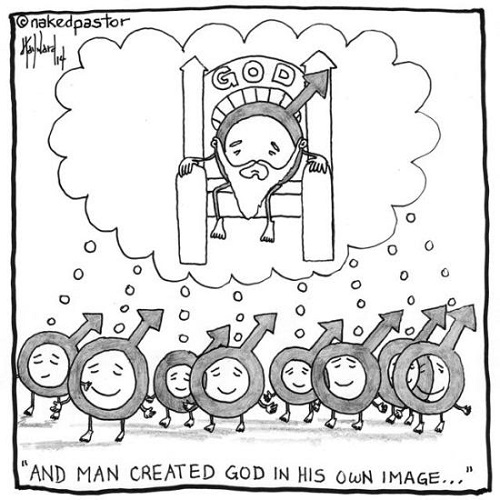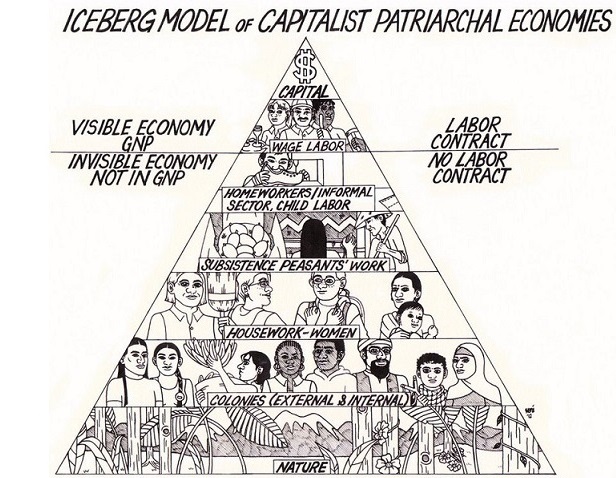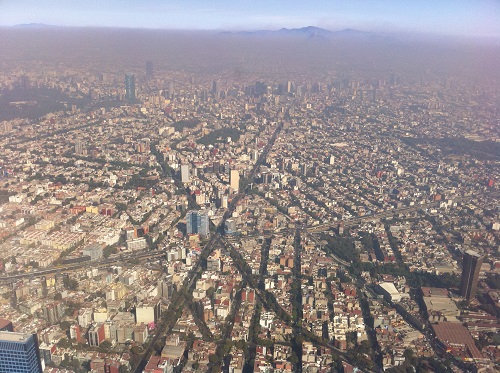
ARTICLES
Editorial Essay: An Integral Ecology for the Anthropocene
How Debt Conquered America, by Jada Thacker
Why We Consume: Neural Design and Sustainability, by
Peter Sterling
Religion with Economics or Economics as a Secular Religion?, by Carmine Gorga
First Comes the Heart, Then Comes the Action, by
Robert Bateman
The Invisible Heart: Sharing the World's Resources, by
Rajesh Makwana
Cuba: Case Example of Solidarity and Sustainability?, by
Jörg Friedrichs
Why We Need to Keep 80 Percent of Fossil Fuels in the Ground, by Bill McKibben
Promising the World: Accountability and the SDGs, by Kate Donald
Income Inequality Overall and by Race and Gender, by
Matt Bruenig
Religion, Patriarchy, and Women's Gender Identity, by
Jenny Ubi
Book Review of Overdevelopment, Overpopulation, Overshoot, by Luis Gutierrez
SUPPLEMENTS
Advances in Sustainable Development
Directory of Sustainable Development Resources
Strategies for Solidarity and Sustainability
Best Practices for Solidarity and Sustainability
Fostering Gender Balance in Society
Fostering Gender Balance in Religion
Meditations on Man and Woman, Humanity and Nature
An Integral Ecology for the Anthropocene
"There can be no renewal of our relationship with nature without a renewal of humanity itself. There can be no ecology without an adequate anthropology." Pope Francis, Laudato Si' #118
An integral ecology for the Anthropocene is one in which humans live in harmony with the human habitat, rather than the current ecopatriarchal mindset of male/human domination and female/nature subordination.
In the beginning, God created humankind, male and female, and said: "Be fruitful and increase in number; fill the earth and subdue it" (Genesis 1:28). But God also "took the man and put him in the Garden of Eden to work it and take care of it" (Genesis 2:15). Furthermore, God created humankind, male and female, as rational animals capable of taking care of each other and making decisions for the common good. In today's world, as we enter the Anthropocene, the common good is becoming increasingly sensitive to human decisions pursuant to resolving the tightly coupled issues of overconsumption and overpopulation.
According to the biblical tradition, the original divine plan was one of growth and communion, albeit within ethically reasonable limits in time and space (Genesis 2:16-17, 3:2-3). But then came the delusion of becoming like God (Genesis 3:4-5), and the shameful decision to abuse the garden (Genesis 3:5-6), which eventually corrupted the original communion of man and woman and brought about the curse of male domination and female subordination (cf. Genesis 3:16). This inevitably led to rivalry and violence between humans (Genesis 4:8), and it didn't take long for the harmony between humans and nature to be corrupted as well, with consequences that continue to reverberate worldwide (Genesis 6:1-7:24).
Henceforth, the path from the pristine "garden" of the beginning to the polluted planet we now inhabit has been guided by the insatiable desire for more stuff, more power, more honors. Not insignificantly, the patriarchal delusion of infinite growth in a finite planet induced, and became further exacerbated by, man recreating God in his own image:

God in Man's Image, by David Hayward, Naked Pastor, 22 May 2014, and
In the Image of Man They Created God; Male They Created Him,
by Kate Wallace Nunneley, The Junia Project, 22 May 2014
Fast forward to the predicament of humankind today, and this is where we are:

Iceberg Model of Capitalist Patriarchal Economies by Hannah Allen, Ecosocialist Horizons
Based on The Subsistence Perspective by Veronika Bennholdt-Thomsen and Maria Mies,
this model illustrates the levels of exploitation in a patriarchal capitalist ecology.
Photographic evidence abounds:

Aerial view of air pollution over Mexico City ~ Source: Wikipedia
CLICK HERE for more views in slide show format
For more photographic evidence, see the excellent book Overdevelopment, Overpopulation, Overshoot. A book review is included in another page of this issue. Needless to say, patriarchy is not intrinsically evil, and there are some manifestations of benign patriarchy that are not bad, but it is hard to imagine any currently significant social or ecological issue that is not rooted in abusive patriarchy; and often the nefarious consequences of the patriarchal order are both social and ecological, as in the current calamity of migrants escaping the Middle East.
Thankfully, the patriarchal culture is passing away, with families evolving from sole male (father) headship to joint male-female (father-mother) headship; a cultural evolution that bodes well for both social and ecological justice. But powerful institutional resistance persists, with organized religious patriarchy being the most formidable obstacle to reconstructing the original unity of man and woman as well as the original harmony, and between humankind and the human habitat. In his recent encyclical, after a comprehensive exposition of the current social and ecological issues, Pope Francis writes: "All of this shows the urgent need for us to move forward in a bold cultural revolution." (Laudato Si', #114).
The most crucial cultural revolution we need is to deconstruct patriarchy and reconstruct, to the maximum extent possible, the originally intended unity of man and woman. There can be no social justice, and no ecological justice, as long as the curse of male domination and female subordination remains enshrined as "the natural order of things." In fact, it is the most unnatural order of things, an oppressive order that calls for liberation (cf. Romans 8:21, Galatians 3:28), as both people and planet are suffering the consequences of this cultural disorder. In addition to fostering a healthier and more egalitarian family structure, and responsible parenthood, the following would be helpful:
- Governance guided by solidarity, subsidiarity, and sustainability
- Transition from consumerist growth to a steady-state economy
- Transition from population growth to demographic stability
- Energy usage and climate change mitigation/adaptation projects
- Implementation of financial transaction/speculation taxes
- Shift from income/property taxes to land/resource value taxes
- Guaranteed basic personal income (conditional or unconditional)
- Corporate social responsibility and triple bottom-line accounting
- Transferring subsidies from fossil fuels to renewable energy
- Fostering gender equality/balance in society and religion
These and other proposals need to be urgently considered, via dialogue at all levels worldwide, in order to make them operational and properly adapted to local cultures and capabilities. There is no magic bullet, we all have to "muddle through" the inevitable transition together. It is possible. "It always seems impossible until it's done" (Nelson Mandela). "Humanity still has the ability to work together in building our common home… Men and women are still capable of intervening positively… All is not lost. Human beings, while capable of the worst, are also capable of rising above themselves, choosing again what is good, and making a new start" (Pope Francis, Lenten Message, 10 February 2016).
|